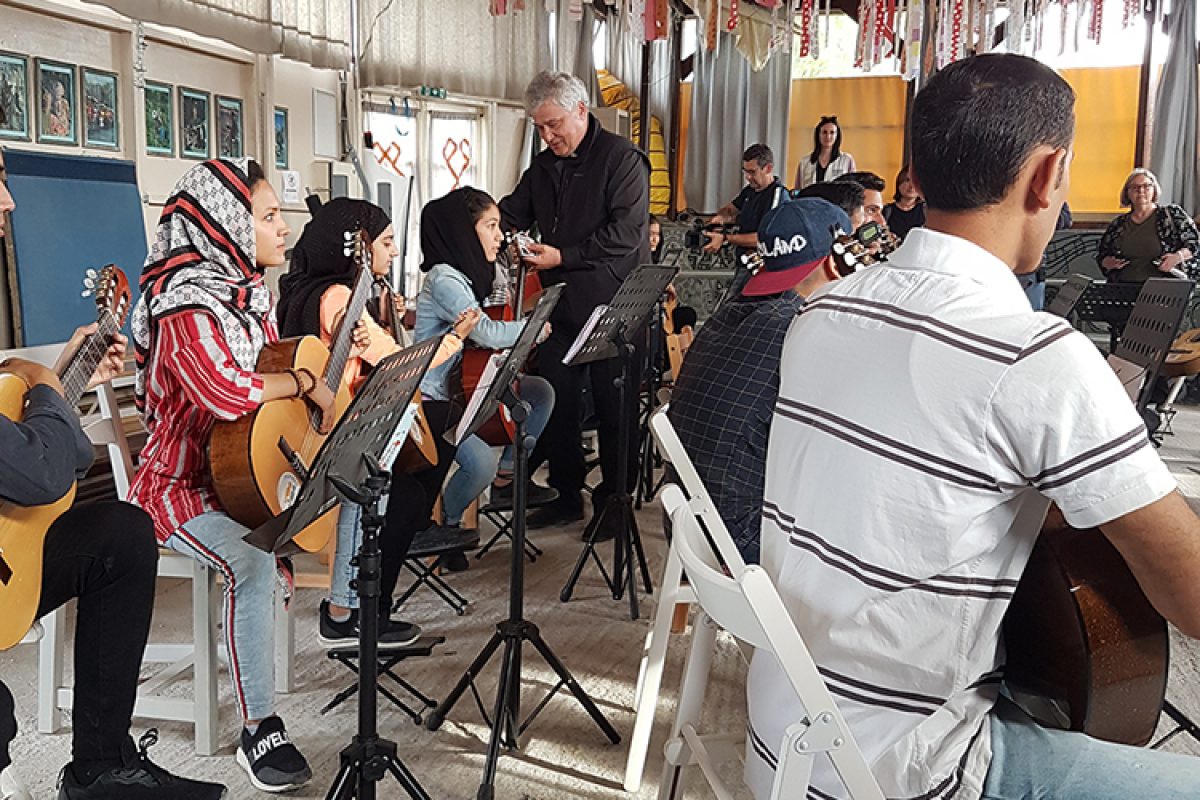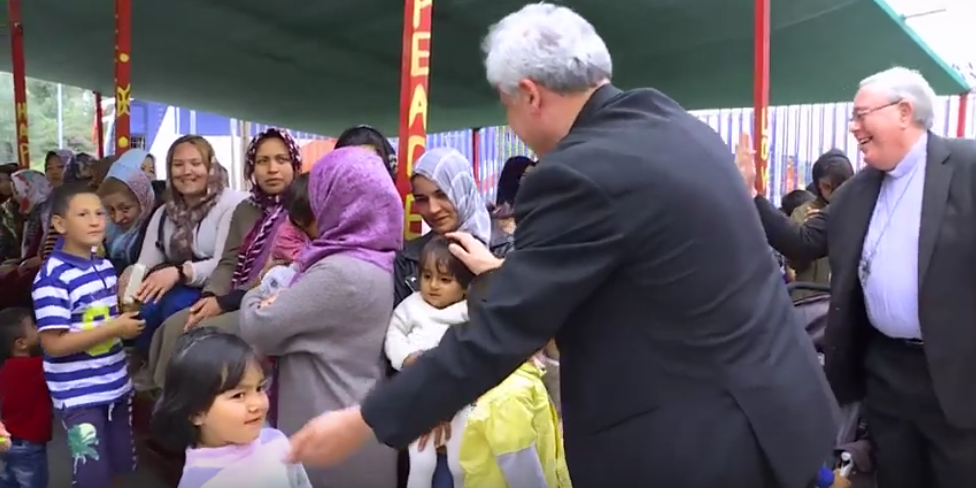Greece: Vatican Delegation Sees Progress in Helping Refugees, but More Needs to Be Done

The Vatican visit highlighted the continuing plight of refugees and migrants seeking sanctuary in Greece, especially on the Greek islands. While the delegation acknowledged the energies devoted to caring for refugees, it urged both the Greek government and the European Union to make still greater efforts to relieve their dire conditions.
Greece has been hit hard by a sudden and large influx of refugees in recent years. According to the UN Refugee Agency (UNHCR), “more than 1 million refugees and migrants arrived in Greece in 2015 and early 2016.” In April 2016, their situation there was so severe that Pope Francis himself, together with the Ecumenical Patriarch Bartholomew, visited two refugee camps on the island of Lesvos, where many of those seeking sanctuary first arrive.
By May 2018, however, the number of refugees and migrants in Greece stood at around 60,000, with approximately 14,000 on the islands. Refugees and migrants are now mainly from Afghanistan, but also include Iraqis, Iranians, Syrians and North Africans. The average stay is anywhere between 8-9 months and 2-3 years.
To reaffirm the Pope’s commitment to the refugees’ plight, a Vatican delegation led by H.E. Cardinal Konrad Krajewski, who serves as Almoner for the Pope, visited Lesvos between 8 and 10 May 2019. It included Msgr. Jean-Claude Hollerich, Archbishop of Luxembourg and President of the European Episcopal Commission and Msgr. Sevastianos Rossolatos, Archbishop of Athens.
The delegation also included Ms. Tanja Zwack, the International Catholic Migration Commission’s Liaison Manager in Athens as well as representatives from Caritas Greece, Saint Egidio Community and Jesuit Refugee Service.
No legal status for unofficial camp
The visit allowed the delegation to obtain a first-hand impression of the situation in the camps. It first visited the Reception and Identification Center in Moria. In effect, this center consists of two sections: the center itself, that is administered by the government, and an unofficial center nearby.
This second camp has no recognized or legal status and, as a consequence, conditions there are dire. Most of the refugees live in tents, with some sleeping in containers. The camp is entirely without amenities: there is no heating, no proper latrine facilities and nowhere for people to wash themselves. Approximately 2,500 people live in this camp.
Conditions in the official center are, on the whole, better. There, 2,000 refugees are provided with food, properly functioning latrines and even a daycare center. But conditions are by no means optimal and it cannot yet be said that the needs of individual refugees are met on a regular basis.
“Positively surprised”
The second visit was to Kara Tepe camp, which the Pope had also visited in 2016. “I was positively surprised, because the camp has evolved significantly and it has become a very nice place for the refugees to stay,” says Zwack, who visited it first in 2015. Kare Tepe hosts around 1,200 people, most of them vulnerable families with children.
People live in containers, but there is a lot of space for children to play, with several playgrounds. Children also attend the local Greek school, where a number of activities are available such as music and language lessons.
According to Zwack, Mr Stavros Myroviannis, a member of the municipality who runs the camp, is instrumental in providing the refugee population with adequate services. “You could see little children coming and hugging him or taking him by the hand… He is really dear to the people in the camp and it is clear that he is doing a great job,” she says.
ICMC’s contribution
With 95 staff members in the country, ICMC is working to help improve the welfare of refugees and immigrants across Greece. They are deployed to the UN Refugee Agency operations in the country, which supports several areas of the Greek government’s services to refugees.
This includes assistance with asylum procedures, cash assistance and the legal, IT and financial aspects of the Reception and Identification Center. ICMC teams are also supporting the Direction of Protection of Asylum-Seekers, the Asylum Service, the National Center for Social Solidarity Ekka as well as the municipalities of Athens, Thessaloniki and Thesaly.
Whilst the Greek authorities are doing their best to help, Zwack believes that the situation can – and must – be improved. “First of all, there should be much faster procedures in order for the people to be able to be transferred to the mainland,” she says. As Lesvos is one of the islands where people first arrive, it is far too crowded to accommodate everyone. To achieve faster transfers, there needs to be greater investment in official personnel.
It is also clear that the European Union needs to do more. Very few relocations to the EU are taking place at present and EU nations other than Greece need to accept a considerably larger share of refugees and migrants.
Immediate help
Zwack’s greatest concern, though, is that the predicament of those in Moria needs to be resolved as a matter of urgency. She’s clear that all those who are in a position to change things, including the Greek government, simply need to do more to relieve the plight of refugees and migrants. “We should really work together on that. Something must be done urgently, to help these refugees,” she concludes.

“Pope Francis has not forgotten the refugee issue, especially here in Moria,” Krajewski said according to news reports. “Efforts are being made on behalf of the Roman Catholic Church to try and open the doors of European countries for refugees stuck here in Greece. The Catholic Church itself is ready to host refugees.”
“Cardinal Krajewski was very approachable and very close to the people,” says Zwack. He talked at length with refugees and others and often hugged them. According to Zwack, the Cardinal insisted that as much as possible should be done to help the thousands of refugees and migrants who, through no fault of their own, are currently stranded in Greece.
The delegation was able to offer immediate help through a cash contribution to Caritas Helas of €100,000 to assist with immediate needs.